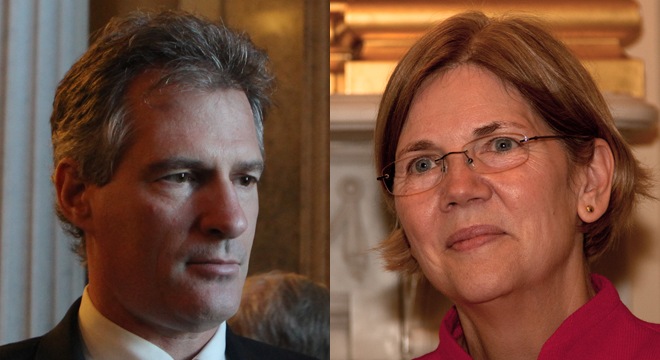Sen. Scott Brown (R-MA) and his Democratic challenger, former White House financial reform adviser Elizabeth Warren, are continuing to duke it out over the Obama administration’s contraception mandates on health insurance, and the Republican bill to create a moral-conviction exemption in response.
Brown is a sponsor of the bill put forward by Sen. Roy Blunt (R-MO). Warren has in turn charged that the Republican bill would provide a loophole for an employer to deny any health care coverage at all. Brown has denied the accusation, and said that the proposal is needed in order to protect religious freedom.
On Friday, the two have published dueling guest op-eds in the Boston Globe, for a head-to-head debate on the issue.
Key quote from Brown’s piece:
I support a bipartisan bill in the Senate that provides a conscience exemption in health care for people of faith. The bill restores the relevant laws on conscience protection that existed before ObamaCare removed them. Some critics say the bill is overly broad and would permit non-religious employers to drop health coverage on a whim. But this is a red herring – the bill does not allow employers to do anything that was not already permitted under federal law as it existed prior to ObamaCare. In fact, the only people talking about dropping health insurance are religious-affiliated organizations that would rather pay a fine than submit to federal rules that would cause them to violate their beliefs.
The legislation borrows language directly from Senator Kennedy, who in 1995 sponsored a bill that that provided an exemption to health care workers and facilities so they would not be required to provide “an item or service under a certified health plan” they found objectionable based on “religious belief or moral conviction.”
It is this same “moral conviction” that is now being labeled “extremist.”
And key quote from Warren’s piece:
What does this mean? If you are married and your employer doesn’t believe married couples should use birth control, then you could lose coverage for contraception. If you’re a pregnant woman who is single, and your employer doesn’t like it, you could be denied maternity care. This bill is about how to cut coverage for basic health care services for women.
Let’s be clear what this proposed law is not about: This is not about Catholic institutions or the rights of Catholics to follow their faith. President Obama has already made sure religious institutions will not be forced to cover contraception – at the same time that he has made sure women can get the health care they need directly from their health care insurers. Carol Keehan, the president and CEO of Catholic Health Association, said that Obama’s approach “protects the religious liberty and conscience rights of Catholic institutions.”
I support Obama’s solution because I believe we must respect people of all religious faiths, while still ensuring that women have access to contraceptives. Brown has rejected this compromise. Instead, he has cosponsored a bill that will let any employer or any insurance company cut off contraceptive care, maternity care, or whatever they want, and leave women without coverage at all for this basic medical care.
Also on Friday, the Massachusetts Democratic Party held a conference call with reporters, hammering Brown on the issue.
State Rep. Ruth Balser (D) said that the Republican bill would open up employers to deny coverage on various kinds of care.
“People may not realize this, but there are actually many individuals who have what they would call a moral objection to mental health care. There are people from small religious groups who question the validity of psychology, and campaign against people have access to mental health care,” said Balser. Also, she said, there are groups who object philosophically to certain kinds of drug-addiction treatment, such as methadone for heroin addicts, believing instead in a by-your-bootstraps approach, and either of these groups could claim a moral exemption.
“It’s the camel’s nose under the tent,” said state Rep. Cory Atkins (D), “and I don’t know why the Catholic Church seems to anoint itself as the superior voice in the discussion,” also later adding: “and the minute you allow groups who are not elected to vote on policy of what’s allowed or not allowed under a bill, you do it at great peril.”






